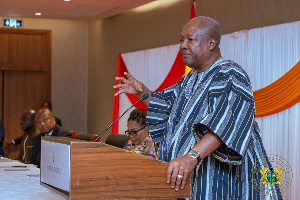The "Apour" festival, celebrated annually by the people of Wenchi, Techiman, and other communities, holds a profound significance beyond its vibrant festivities and cultural rituals.
Rooted in the Twi word "po" meaning "to reject," Apour symbolizes a collective rejection of evil, calamities, unrighteousness, disasters, worries, curses, stress, or anything unwanted within society. This traditional event, typically held between March and April, serves as a powerful testament to the principles of accountability, transparency, and democratic governance.
At its core, the Apour festival embodies a deeply ingrained ethos of accountability and feedback within leadership. During the festival, the chief sits in state as community members openly express their thoughts and concerns regarding his leadership. This unique tradition transforms the festival into a 360-degree feedback tool, where the chief receives candid assessments of his
governance directly from the people he serves.
The accountability process during Apour is both transparent and participatory. If the chief is found to have mismanaged state funds or engaged in morally questionable behavior, the community expresses their grievances through songs composed specifically to address these issues. These songs serve as a form of public accountability, highlighting areas where the chief may need to improve or rectify his actions.
Furthermore, the Apour festival reflects a commitment to peer review and constructive criticism, even within traditional leadership structures. Despite chiefs being selected rather than elected, they willingly subject themselves to the principles of accountability and feedback. This willingness to listen to and learn from community feedback challenges the misconception that traditional leaders are autocrats, showcasing their openness to self-improvement and growth.
Interestingly, echoes of the Apour principle can be observed in modern democratic institutions, such as parliament.
Following the president's address, opposition and majority parties often engage in a symbolic exchange of songs to express their verdict on the administration's performance. This practice mirrors the tradition of using music and public discourse to provide feedback on leadership, demonstrating the enduring relevance of Apour's principles in contemporary governance.
In essence, the Apour festival serves as a powerful reminder of the importance of accountability, transparency, and constructive feedback in leadership. By embracing these principles, both traditional and modern leaders can foster trust, strengthen governance, and empower communities to actively participate in shaping their collective future. As the proverbial saying goes, "The one constructing the road might not know that its back is crooked," highlighting the necessity for leaders to welcome feedback and strive for continuous improvement.
Opinions of Friday, 1 March 2024
Columnist: Gilbert Sebe-Yeboah















